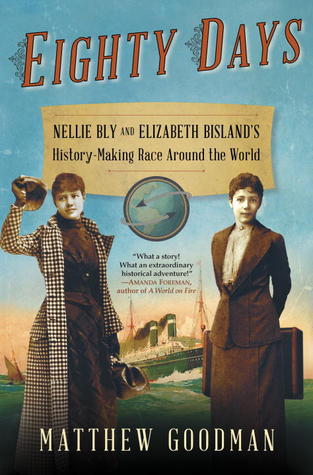
by fljustice | Feb 26, 2013 | Biographies, Books, History, Reviews, Wonderful Women
Eighty Days: Nellie Bly and Elizabeth Bisland’s History-Making Race Around the World
by Matthew Goodman
 From the back cover:
From the back cover:
“On November 14, 1898, Nellie Bly, the crusading young female reporter for Joseph Pulitzer’s World newspaper, left new York City by steamship on a quest to break the record for the fastest trip around the world. Also departing from New York that day—and heading in the opposite direction by train—was a young journalist from The Cosmopolitan magazine, Elizabeth Bisland. Each woman was determined to outdo Jules Vern’s fictional hero Phileas Fogg and circle the globe in less than eighty days. A vivid real-life re-creation of the race and its aftermath, this is history with the heart of a great adventure novel.”
I delight in spotlighting the lives and accomplishments of women in past times—particularly “ordinary” women doing extraordinary things. Eighty Days is a true adventure story about two young female journalists who traveled around the world—in opposite directions—alone, during the heart of the Victorian Age. Matthew Goodman does an excellent job bringing these two women to life, filling in the background of exotic locations and Victorian attitudes as they make their remarkable journey—not just around the world, but through life. (more…)
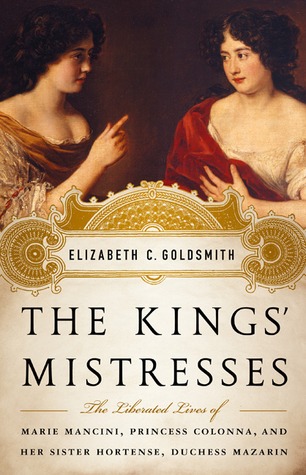
by fljustice | May 21, 2012 | Biographies, Books, Reviews, Wonderful Women
“The Kings’ Mistresses” by Elizabeth C. Goldsmith
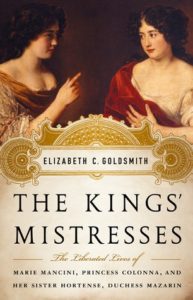 I love a good story about women pushing the boundaries in times past, especially when they are based on real people. The Kings’ Mistresses is the true tale of two sisters: Marie Mancini and her younger sister Hortense, the nieces of one of the most powerful men in seventeenth century France, Cardinal Mazarin (a protégé of Richelieu.) Mazarin, rose from obscure roots in Rome to become Prime Minister to the Queen Regent of France, Anne of Austria and her son Louis XIV. Along the way he acquired great wealth as well as influence and enemies. He hoped to consolidate his influence by the well-known ploy of strategic marriage, so he summoned his Italian nieces and nephews to the French court. In 1653 Marie, “a dark-haired and intelligent-looking adolescent of thirteen” and Hortense, “a mere child of six, with curly black hair and striking in her delicate beauty” left their home in Rome to travel to Paris. It was the first of many journeys in their fascinating lives. (more…)
I love a good story about women pushing the boundaries in times past, especially when they are based on real people. The Kings’ Mistresses is the true tale of two sisters: Marie Mancini and her younger sister Hortense, the nieces of one of the most powerful men in seventeenth century France, Cardinal Mazarin (a protégé of Richelieu.) Mazarin, rose from obscure roots in Rome to become Prime Minister to the Queen Regent of France, Anne of Austria and her son Louis XIV. Along the way he acquired great wealth as well as influence and enemies. He hoped to consolidate his influence by the well-known ploy of strategic marriage, so he summoned his Italian nieces and nephews to the French court. In 1653 Marie, “a dark-haired and intelligent-looking adolescent of thirteen” and Hortense, “a mere child of six, with curly black hair and striking in her delicate beauty” left their home in Rome to travel to Paris. It was the first of many journeys in their fascinating lives. (more…)
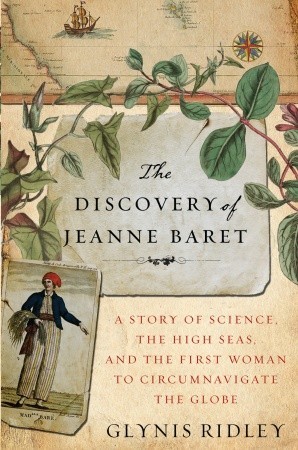
by fljustice | Feb 29, 2012 | Biographies, Books, Free stuff, Guest Post, History, Wonderful Women
Guest Post: Glynis Ridley on “The Discovery of Jeanne Baret”
 I’ve been in rewrite mode lately and ignoring my blog. But just in time for Women’s History Month, Glynis Ridley has kindly stepped in with a guest post talking about her non-fiction adventure story The Discovery of Jeanne Baret: A Story of Science, the High Seas, and the First Woman to Circumnavigate the Globe. I first ran across Jeanne Baret’s remarkable story in another book She Captains: Heroines and Hellions of the Sea by Joan Druett; and, yes, women have commanded navies, captained ships and served as crew long before modern times. I was delighted to have the opportunity to read Ms. Ridley’s riveting account of one these remarkable and neglected woman. Thanks to her publisher Broadway Paperbacks for providing two copies for a giveaway. (See the end of the article for details.) (more…)
I’ve been in rewrite mode lately and ignoring my blog. But just in time for Women’s History Month, Glynis Ridley has kindly stepped in with a guest post talking about her non-fiction adventure story The Discovery of Jeanne Baret: A Story of Science, the High Seas, and the First Woman to Circumnavigate the Globe. I first ran across Jeanne Baret’s remarkable story in another book She Captains: Heroines and Hellions of the Sea by Joan Druett; and, yes, women have commanded navies, captained ships and served as crew long before modern times. I was delighted to have the opportunity to read Ms. Ridley’s riveting account of one these remarkable and neglected woman. Thanks to her publisher Broadway Paperbacks for providing two copies for a giveaway. (See the end of the article for details.) (more…)
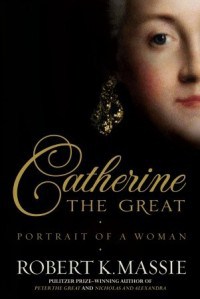
by fljustice | Dec 2, 2011 | Biographies, Books, History, Reviews, Wonderful Women
“Catherine the Great: Portrait of a Woman” by Robert K. Massie
From the book jacket:
“The Pulitzer Prize-winning author of Peter the Great, Nicholas and Alexandra, and The Romanovs returns with another masterpiece of narrative biography, the extraordinary story of an obscure young German princess who traveled to Russia at fourteen and rose to become one of the most remarkable, powerful, and captivating women in history.”
 Massie delivers a wonderfully researched and readable book. My knowledge of Catherine the Great was vague to the point of mythical. I had hazy memories of multiple lovers, a (possible) scandal about her and a horse, and a movie starring Greta Garbo. The lovers were real, but few; there was no mention of the horse; and the Garbo movie turned out to be about Queen Christina of Sweden who lived a century earlier. So much for memory.
Massie delivers a wonderfully researched and readable book. My knowledge of Catherine the Great was vague to the point of mythical. I had hazy memories of multiple lovers, a (possible) scandal about her and a horse, and a movie starring Greta Garbo. The lovers were real, but few; there was no mention of the horse; and the Garbo movie turned out to be about Queen Christina of Sweden who lived a century earlier. So much for memory.
To say Catherine is a fascinating character is to do her a disservice. Massie shows her towering intellect, force of personality, and steely resolve from an early age. He also shows her craving for love and approval; denied in childhood and in her marriage. But her story is not a simplistic psycho-drama, it’s populated with complicated characters, shifting political agendas (both domestic and foreign), and colored with the burgeoning philosophies of the Age of Enlightenment. (more…)
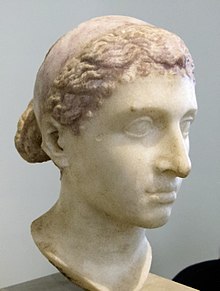
by fljustice | Apr 26, 2011 | Biographies, Books, Reviews, Wonderful Women
“Cleopatra: A Life” by Stacy Schiff
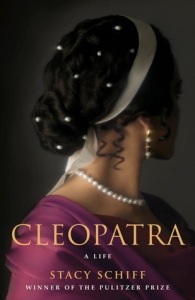 I have a soft spot for strong women in history. I’ve written about Hypatia, the Lady Philosopher of Alexandria; Empress Galla Placidia and her niece Pulcheria who both ruled Rome in its waning days. I’ve read about Boudica, Queen of the Iceni; Amanirenas, the one-eyed warrior queen of Kush; and Zenobia, Queen of Palmyra; all of whom defeated Roman armies, only to succumb later to that massive military machine. Most of my favorites are little known women who ruled countries, commanded armies and navies, dealt astutely with ruling male neighbors and made a difference in their people’s lives. I like to read and write about them because they are little known. I like introducing readers to new characters and broadening the scope of history. Occasionally, I’ll run across a woman I thought I knew, and find out I’m wrong. Cleopatra is one. (more…)
I have a soft spot for strong women in history. I’ve written about Hypatia, the Lady Philosopher of Alexandria; Empress Galla Placidia and her niece Pulcheria who both ruled Rome in its waning days. I’ve read about Boudica, Queen of the Iceni; Amanirenas, the one-eyed warrior queen of Kush; and Zenobia, Queen of Palmyra; all of whom defeated Roman armies, only to succumb later to that massive military machine. Most of my favorites are little known women who ruled countries, commanded armies and navies, dealt astutely with ruling male neighbors and made a difference in their people’s lives. I like to read and write about them because they are little known. I like introducing readers to new characters and broadening the scope of history. Occasionally, I’ll run across a woman I thought I knew, and find out I’m wrong. Cleopatra is one. (more…)
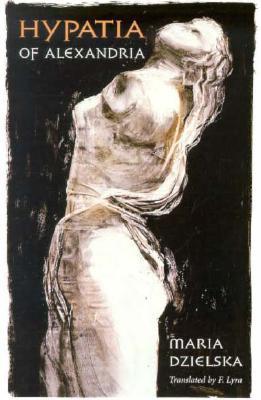
by fljustice | Mar 12, 2011 | Biographies, Books, Hypatia, Reviews, Wonderful Women
Hypatia of Alexandria: Two Books
It’s March—Women’s History Month and the anniversary of a remarkable woman’s death. In AD 415, a Christian mob murdered Hypatia, the renowned Lady Philosopher of Alexandria. The vicious act shocked the city and shamed the early Church. Socrates Scholasticus tells the story in his Historia Ecclesiastica:
“Hypatia, daughter of the philosopher Theon, who made such attainments in literature and science, as to far surpass all the philosophers of her own time…For all men on account of her extraordinary dignity and virtue admired her the more. Yet even she fell a victim to the political jealousy which at that time prevailed. For as she had frequent interviews with Orestes, it was calumniously reported among the Christian populace, that it was she who prevented Orestes from being reconciled to the bishop. Some of them therefore, hurried away by a fierce and bigoted zeal, whose ringleader was a reader named Peter, waylaid her returning home, and dragging her from her carriage, they took her to the church called Caesareum, where they completely stripped her, and then murdered her with tiles. After tearing her body in pieces, they took her mangled limbs to a place called Cinaron, and there burnt them. This affair brought not the least opprobrium, not only upon Cyril, but also upon the whole Alexandrian church. And surely nothing can be farther from the spirit of Christianity than the allowance of massacres, fights, and transactions of that sort. This happened in the month of March during Lent, in the fourth year of Cyril’s episcopate, under the tenth consulate of Honorius, and the sixth of Theodosius.”
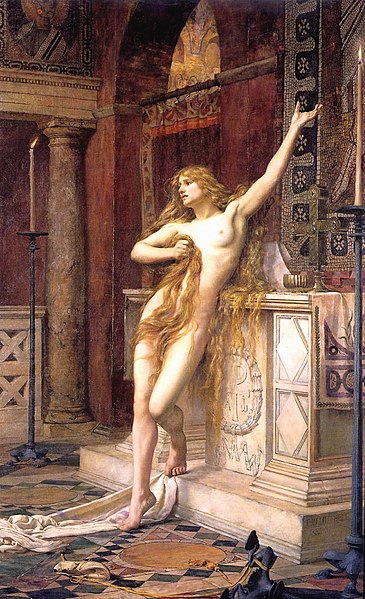
Hypatia, painted by Charles William Mitchell in 1885.
Since that time, only fragments about Hypatia’s life have come down to us; allowing poets, novelists, playwrights, scientists, feminists and religionists (both pro and anti) to appropriate her story for themselves. Her story has resonated down through the years, touching many people. She’s a major character in my novel Selene of Alexandria, the subject of the recent movie Agora directed by Alejandro Amenabar, and she rated a plate in Judy Chicago’s massive art piece The Dinner Party. She’s the subject of plays, poetry, propaganda and new age pagan polemics. Her life is represented in art and music. But what do we really know about her? Not much.
In researching my novel, I waded through a literary swamp, with no guide, trying to get at some coherent view of Hypatia and her story. She was young/middle aged/older when she died. She was single/married/promiscuous/virginal. She was a pagan/witch/Christian. She was a brilliant mathematician/scientist to some and, according to others, contributed nothing worthwhile in either discipline. I read the few primary sources, but didn’t have the academic background to evaluate their usefulness. Socrates was a contemporary, but a church historian. Damascius was a pagan who wrote a full generation later. John of Nikiu wrote 200 years later. Who had an agenda and what was it?
Two scholars have attempted to pull the pieces together in book form in the last two decades: Maria Dzielska, a Polish classics scholar, with Hypatia of Alexandria; and mathematics professor Michael A. B. Deakin with Hypatia of Alexandria: Mathematician and Martyr. I’ve read both, several times, in my research and want to share my thoughts. (more…)









